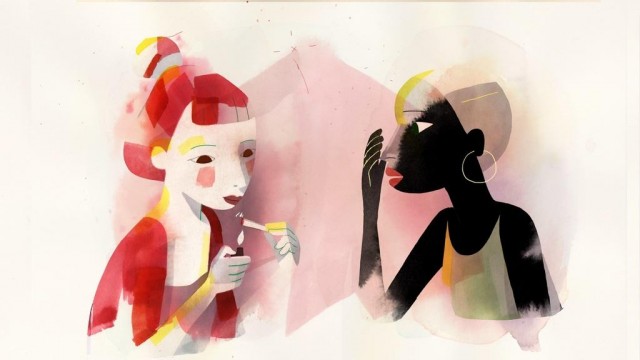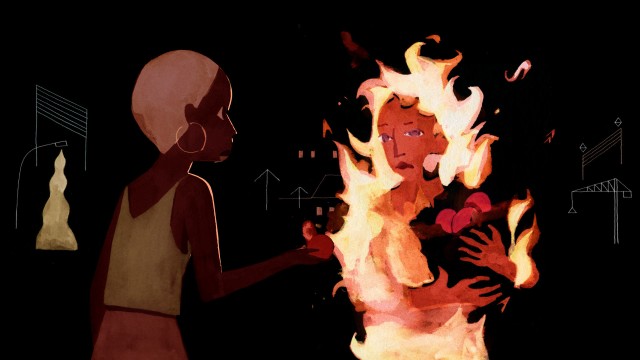Winner of awards at Annecy, Berlin, Fantasia, Glas, Go Short and more, Adrien Merigeau’s (Old Fangs) Genius Loci is one of the most-acclaimed animated shorts of recent times. Combining loose, poetic storytelling with a rich, surprising aesthetic to explore themes of spirituality and belonging, this is the type of filmmaking you can easily lose yourself in, engulfed by the meditative nature of the piece and free to drift within the evolving boundaries of the narrative.
Narratively, Merigeau’s film follow’s central character, described in the logline as “a young loner”, as she wanders a continuously morphing cityscape in search of answers to an undefined question. It feels as if she’s on some kind of spiritual quest, searching within herself as much as she’s searching the surrounding environments. As she’s drawn to a church by some unorthodox organ playing, she meets a friend and they begin a contemplative conversation on their lives, music and more. As Reine’s focus on the discussion drifts, a transformation occurs and she finds herself prowling the night-time streets, desperate to find her way home.

Reine in discussion with her friend in Adrien Merigeau’s Genius Loci
It’s fair to say that Genius Loci is based around a freewheeling storyline, with its director revealing – in an interview with Alex Dudok de Wit for Cartoon Brew – that he had a “hard time writing the script”, as he was trying to make a film where the story would “drift into a contemplative state” and lose its meaning. Rewriting that script around 20-times over a two year period, Merigeau finally settled on a narrative core that would work to support the abstract, experimental animation.
Inspired by a group of artist the filmmaker met when he was in Kilkenny, Ireland, Merigeau says he found “the way they were living the moment was very inspiring to me”. Exploring “the birth of a person’s inner spirituality”, Genius Loci plays like a film interested in the importance of self perspective, learning to accept who we are and how we can use the strength of our spirit to deal with all kinds of trauma. Yet, Merigeau is keen to point out that he didn’t want to act as a guide to help his audience navigate his film, as he explains in this conversation with Vimeo curator Blair Barnes:
I didn’t want to explain anything explicitly, but rather for the audience to feel drawn into — and carried by — the on-screen presence throughout the film, like a raft drifting on a river. It took a lot of trial and error for that flow to start working, as I discovered what the film needed to be about, for it to feel tight and not too far-reaching or spread out.
Having watched Genius Loci at a number of festivals, it took me a few attempts to really appreciate the bold piece of filmmaking it is. That loose narrative won’t be for everyone, but if you’re open to it and as Merigeau describes, let it take you on a journey, its impact can be deeply moving and almost transcendent. Even if the storyline doesn’t strike you with that kind of power, it’s hard not to watch this short and be totally in awe of the striking aesthetic. A collaborative effort which saw Merigeau worked with Belgian cartoonist Brecht Evens, César winner Céline Devaux (Sunday Lunch), Alan Holly (Old Fangs, Coda), Vaiana Gauthier and Chenghua Yang, with the incredible talent involved in the production, it’s no surprise Genius Loci is such an aesthetically pleasing piece.

The visuals of Adrien Merigeau’s Genius Loci are some of the most impressive we’ve seen in recent years.
Speaking of the process, again in that Cartoon Brew interview, Merigeau describes it as “like doing a big puzzle”, where some areas of the film were explicate and others were much more obscure and free for improvisation. Claiming his own approach is “very anxious and control-freaky”, the director admits it was “really wonderful and easy to work like that” as the artists he worked with were, “much more spontaneous and intuitive and free”.
Having seemingly played every festival under the sun, it’s exciting to finally see Genius Loci online. As I mentioned earlier, the narrative didn’t work for me on first viewing and it’s certainly a film deserving of an instant second viewing, even if it’s just to take in the rich, complex style.

 Rob Munday
Rob Munday